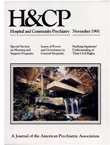Effects of Sheltered Care Environments and Resident Characteristics on the Development of Social Networks
Abstract
Two hundred and thirty-four members of a 1973 sample of shelterd care residents, three-fourths of whom had schizophrenic disorders, were followed up between 1983 and 1985 to examine the role of supportive and of transitional, high-expectation sheltered care environments in the development of residents' social networks. The influences of revolving-door treatment experiences, psychopathology, and institutionalization were taken into account. The results showed that supportive rather than transitional, high-expectation environments contributed to the development of emotionally and instrumentally supportive social networks. Higher levels of psychopathology and a history of institutionalization resulted in the absence of certain support relationships. Surprisingly, revolving-door treatment experiences were related to positive support and social network outcomes.
Access content
To read the fulltext, please use one of the options below to sign in or purchase access.- Personal login
- Institutional Login
- Sign in via OpenAthens
- Register for access
-
Please login/register if you wish to pair your device and check access availability.
Not a subscriber?
PsychiatryOnline subscription options offer access to the DSM-5 library, books, journals, CME, and patient resources. This all-in-one virtual library provides psychiatrists and mental health professionals with key resources for diagnosis, treatment, research, and professional development.
Need more help? PsychiatryOnline Customer Service may be reached by emailing [email protected] or by calling 800-368-5777 (in the U.S.) or 703-907-7322 (outside the U.S.).



